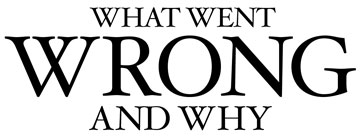LEGACY BETRAYED

Court order was the final blow to fired employee
THE STAR-BULLETIN recently published excerpts from our new book, "Broken Trust: Greed, Mismanagement & Political Manipulation at America's Largest Charitable Trust," and then letters from Star-Bulletin readers. Now Judge Eden Elizabeth Hifo (formerly Bambi Weil) is
questioning two statements from the book. Both relate to Bobby Harmon, a man who tried unsuccessfully to put a spotlight on wrongdoing at Bishop Estate (
Star-Bulletin, March 1).
EXCERPTS FROM THE BOOK
Sunday: Trustees of Bishop Estate held power without accountability, a recipe for disaster.
Monday: The selection of Bishop Estate trustees by Supreme Court justices showed signs of manipulation.
Tuesday: Kamehameha Schools alumni, staff and students rose up against trustee Lokelani Lindsey.
Wednesday: Investigating Bishop Estate was like probing the CIA, said a court-appointed master.
Thursday: Attorney General Margery Bronster went head to head with Supreme Court justices over trustee selection.
Friday: Instead of housecleaning, the interim trustees of Bishop Estate "handed the keys to the old guard."
Sunday: Readers weigh in on the new "Broken Trust" book in letters to the editor.
starbulletin.com/specials/bishop.html
This link takes you to the original "Broken Trust" essay of Aug. 9, 1997, and other Star-Bulletin stories about Kamehameha Schools.
|
Judge Hifo says the book "inaccurately asserted that court rulings had silenced Bobby Harmon's whistleblowing." She then cites the record selectively and leaves readers with the impression that she did not restrain Harmon in any way. We suggest that readers consider the entire record, and pay particularly close attention to what Hifo does not say.
FOR EXAMPLE, Hifo does not deny that she enforced a protective order, which prevented Harmon from giving information to members of the media. She also does not deny that Harmon was forced to retrieve materials that he had already given to a reporter. Finally, she does not deny that she prohibited Harmon from passing along Bishop Estate documents, even to government officials, if Bishop Estate claimed attorney/client privilege or attorney/work product privilege.
Hifo contends that her rulings did not amount to a muzzling because Harmon still had a right to communicate with government officials. What she fails to understand or acknowledge is that Bishop Estate at that time was asserting attorney/client or attorney/work product privilege for key documents that passed through the hands of Nathan Aipa, the estate's chief in-house attorney, including documents that Harmon wanted to share with others.
By the time Harmon appeared in court, he had already tried his best to get the attention of government officials. It was their failure to act that prompted him, out of frustration and on the advice of counsel, to communicate with the media despite the protective order.
THE BOTTOM LINE on this issue, then and now, is that Judge Hifo enforced an injunction that prohibited Harmon from sharing his information with anyone from the media, and even from government officials when Bishop Estate claimed that the information was privileged.
Hifo also alleges that the excerpt in question "inaccurately asserted that Harmon could not collect unemployment benefits after Bishop Estate discharged him." She acknowledges that Bishop Estate successfully prevented Harmon from receiving unemployment benefits following his firing (i.e., the state agency that administers the unemployment-benefits program ruled in favor of Bishop Estate), and adds that she eventually overturned the agency's decision and that her ruling was on appeal to the state Supreme Court when the parties "filed a stipulation to dismiss the appeal." This is literally true, but misses the point.
Harmon lacked the financial ability to continue battling Bishop Estate, and he viewed a lawsuit against Bishop Estate in the state Supreme Court as a fool's errand. Settling his case under such conditions left him financially ruined and still "muzzled."
Samuel King and Randall Roth
Authors of "Broken Trust"
LEGACY BETRAYED
WHAT WENT WRONG AND WHY
This week the Honolulu Star-Bulletin is excerpting chapters of a new book about the Kamehameha Schools/Bishop Estate scandal that erupted in 1997 and forced the removal of trustees and changes in the estate's management. "Broken Trust: Greed, Mismanagement & Political Manipulation at America's Largest Charitable Trust" was written by two people at the heart of the event, Judge Samuel King and law professor Randall Roth. The book was published by the University of Hawaii Press (uhpress.hawaii.edu).
|

